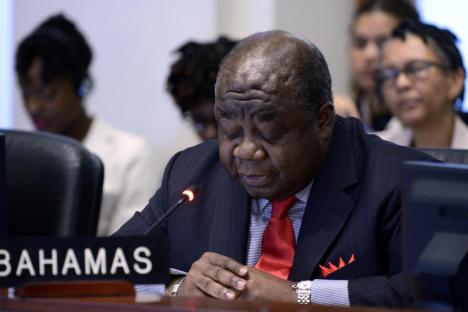BANKING CHALLENGES UNDERMINE MANY DEVELOPING COUNTRIES, SAYS BAHAMAS AMBASSADOR
01 abril 2016
Fuente: Caribbean News now
Fuente: Caribbean News now
 |
|
|
Bahamas ambassador Dr Elliston Rahming (Caribbean News Now)
WASHINGTON, USA -- Speaking on Wednesday at the special meeting of the Permanent Council of the Organization of American States (OAS) held to address the issue of banking and financial services challenges in the Americas, Bahamas ambassador Dr Elliston Rahming, highlighted “assertions which undermine the legitimacy of my country’s financial services sector and policies that limit many developing countries, like mine, from access to development financing”. Beginning his remarks by declaring that The Bahamas’ “delegation stands in solidarity with the statement delivered on behalf of CARICOM,” Rahming also extended thanks to Permanent Council chairman Sir Ronald Sanders “for convening this important meeting today to facilitate engagement, here in this hemispheric forum, on issues that present real challenges to the integral development of many member states.” He also extended “a special welcome to my fellow countrymen” Ryan Pinder, Member of Parliament and former minister of financial services, and Sir Michael Barnett, former attorney general and chief justice of the Supreme Court of The Bahamas, who was at the meeting as a guest of Pinder, one of the three financial experts who addressed the meeting. “We hope that the conversation today will dispel myths regarding indicators of economic development and move the hemisphere closer towards a uniform and level playing field we expect in the field of financial services,” Rahming said. He added: “The Bahamas is a well-established, well-regulated and fully compliant financial jurisdiction and yet we, alongside many colleague Members here, continue to face a seeming cascade of arbitrary and spurious designations as a ‘tax haven’. The recent ‘tax haven’ labeling initiatives across the United States seem to have caused reputational damages to our jurisdictions, as opposed to reaching its intended objective of enhancing State tax revenues. “The Bahamas has an exemplary history of functional bilateral cooperation through tax information exchange since 2003 and we have met and exceeded international standards for tax information exchange as set by the OECD through the adoption of some 30 bilateral Tax Information Exchange Agreements. We have further already committed to comply with the OECD and G20 automatic tax information exchange standard that will take effect from 2018, through bilateral mechanisms with interested and appropriate partners that meet standards on confidentiality, data safeguards and proper use of information. “Despite these efforts, the ongoing designation of The Bahamas, as a tax haven, particularly across several US states, seems to be a peculiar instance of dissonance between US federal and state levels of government, which is particularly troubling in light of the unprecedented work that we have done and continue to do to be fully compliant with United States and OECD tax authorities requirements.” Continuing, Rahming said, “We hope that today’s conversation will reinforce the need for an inclusive, participatory and broad-based dialogue on international cooperation in tax matters in the hemisphere and the need to move towards the uniform and level playing field in the Americas that we all desire. “My delegation also hopes that this organization will also provide a forum for further consideration of matters related to the need for evolution in the lending criteria used by international financial institutions. The criteria used generally by international financial institutions (IFIs) to determine access to capital and concessions are fundamentally flawed. Conceptually, denying access to concessional resources is not supposed be an automatic consequence of reaching a particular income level, but rather, it is supposed to be a formal determination based on an assessment of whether the country has reached a level of development, including having institutional capacity, and capital-market access that enables a country to sustain its own development process without recourse to IFI funding. “In practice, however, these metrics are harder to measure and the dependence on GNI per capita, as it is an easily identifiable statistic, leads to instances of misinterpretation of a country’s economic circumstances and premature graduation. This occurs because GNI per capita is a crude tool, which does not account for income distribution or the special vulnerabilities of small island developing states, of which most CARICOM countries would be included. In order to ensure that international financial institutions do not hinder, as opposed to facilitate development, formal recognition of the special circumstances of small island development states (SIDS) and acceptance of a common but differentiated responsibility policy towards SIDS is necessary.” Rahming said it is “counterintuitive for countries to pledge in one fora to seek to improve competitiveness, expand development horizons and eradicate poverty and then with the proverbial invisible hand impose conditions that place those goals in jeopardy.” “The impact of the contraction of corresponding banking relations, the reputational damage from arbitrary assertions which undermine the legitimacy of a country’s financial services sector and policies that limit developing countries, like mine, from access to development financing help make collectively espoused development goals more difficult to attain than they need to be,” the Bahamian envoy said. Declaring that the OAS has “a role to play in advancing initiatives that will enhance the opportunities for development,” Rahming added, “We look forward to SEDI’s greater involvement in matters such as those raised in this morning’s deliberations.” He concluded, “Again, we thank you chair for convening today’s meeting. We offer our endorsement of the declaration before us and we reaffirm that we see this as the first of many discussions on real challenges to our collective, integral development and which can move the hemisphere closer towards the uniform and level playing field we all expect.” |
|








